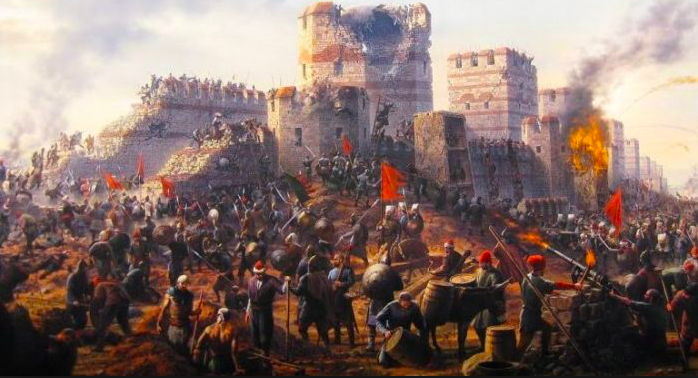China vs. America: The Biggest Threat We Face (Part 3)

- Nov 21, 2018
- admin
- Geopolitics, Investing, Uncategorized
I was going to use this weeks article to discuss the evolving cyber war / AI battlefield between the United States and China.
The plan was to go thru great lengths to explain how, in the not-too-distant future, warfare as we know it could be a thing of the past.
For instance, a live fire war would be moot if one side was able to disable its opponents communications infrastructure first.
What moves would you have left if your military satellites stopped working? Or even worse, they were used to turn your own missiles against you?
But at the last minute I decided to take another approach. Called an audible at the line of scrimmage.
Figured I’d use my third and final article in this “China vs. America” series to discuss a bigger danger than China.
Let me explain.
The study of Roman (and Greek) history is one of the great passions of my life.
To this day, I can’t imagine a better vacation than one that starts with a historical tour in Italy. It’s like an amusement park for adults.
One of the constant debates among scholars of Roman history is: what caused the collapse of the Roman Empire?
Some, like Edward Gibbon, believe it was the transition from Paganism to Christianity. The country became divided and was no longer able to unite against common enemies.
Others believe it was Rome’s inability to hand down power peacefully. The minute one leader died, a civil war would start to decide the next one. By the third century, most leaders were simply killed by their lieutenants and power was taken forcefully.
Still others believe that Rome collapsed because it faced two tough competitors at the very same time: Persians from the East and Germans from the North. It’s almost impossible for any power no matter how great to fight a two-front war.
Each theory has merit on its own. But I’ve never believed that Rome collapsed for any one reason. The “silver bullet” theory just never fit right with me.
But then the 2008 financial crisis happened.
It was then that I began to develop my own “silver bullet” theory as to why the Roman Empire collapsed. It’s a theory that I’ve been pondering for the past decade.
Here it is:
Rome collapsed simply because its citizens stopped believing in it.
- -They stopped believing in fiscal responsibility…
- -They stopped believing in Rome’s Gods…
- -They stopped believing that Rome only fought “just wars”…
- -They stopped believing that the greatest honor a citizen could have was to fight for his country…
- -They stopped believing in public service and civic duty…
- -They stopped believing that anyone could rise to the top…
- -They stopped believing the Empire was worth the heavy taxes they had to pay to defend it…
By the time the Persians and Germans attacked the average citizen didn’t even care.
And why would they?
Half of their income went to pay taxes to support the mercenaries that made up the military. And whatever money was left over was debased further and further each year.
What’s there to defend? A bit in their mouths and a saddle on their backs?
Rome collapsed because the average citizen no longer believed Rome was worth even paying for, never mind fighting or dying for.
I bring this up because competitors of ours will come and go.
From Nazi Germany to the Soviet Union to China, there will always be a new challenger who wants to take the top spot from us.
But it’s not them that I worry about anymore. It’s us.
If we want it bad enough we can do it. But after the 2008 financial crisis I began to debate whether we wanted it bad enough anymore.
The canary in the coal mine for me has been our inability to get our spending under control.
A nations budget is a great symbol of its core beliefs. It answers a key question:
Does the country make reasonable sacrifices today for a better tomorrow?
And the answer in our case is “No”.
Our budget deficits prove that we just can’t stop spending more than we take it. We now spend an eye-popping $100 billion a month more than we earn.
A $100 billion each month!
And the higher our budget deficit, the higher our debt goes. The higher our debt goes, the lower our ability to educate our children and defend our nation goes.
—Without money we lose our ability to project power. As our global footprint shrinks, China will fill the vacuum.
—Without money we can’t afford to properly educate our children. And that’s what insures the next generation of Americans can field a great team.
Yes, if China takes the top spot from us it will be because we gave it to them.
And that was what the 2008 financial crisis taught me. The “Greatest Crisis Since the Great Depression” forced me to ask myself the one question that really matters:
Have we lost the desire to make personal sacrifices for the good of our country?
Sadly, I think the answer is yes.
And my opinion won’t change until I see leadership that takes our fiscal responsibility seriously.
The silver lining? Common enemies tend to unite a population.
Our elected officials worked much more closely together when we competed against the Soviet Union. They started each day agreeing with each other on six out of the ten big issues of the day.
In many ways, we’ve been rudderless since the Soviet Union collapsed. A serious global competitor may be just what the doctor ordered.
Let’s hope China brings out the best in our generation too.
Happy Thanksgiving,
Dylan Jovine
